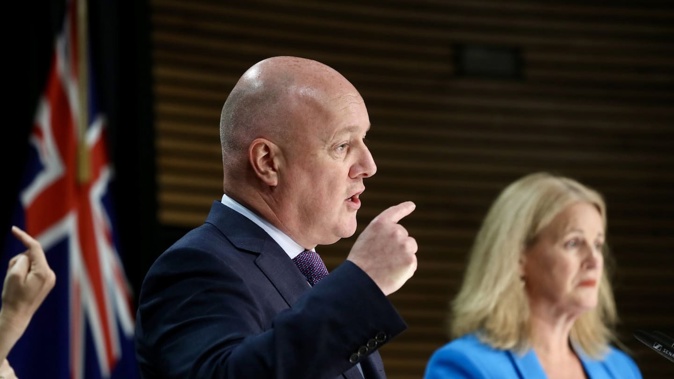
- More than 200,000 people were on a Jobseeker benefit in September, risking the Government’s 2030 target.
- Prime Minister Christopher Luxon expressed confidence in economic improvement, citing lower inflation and a dropping OCR.
- Social Development Minister Louise Upston noted an 18% increase in people coming off Jobseeker benefits.
More than 200,000 people were on a Jobseeker benefit in September this year, putting at risk the Government’s target to reduce this to 140,000 people by 2030.
Prime Minister Christopher Luxon revealed the latest quarterly update on his nine public service targets yesterday, adding that the unemployment numbers were of “particular concern” but would drop as the economy improved.
How much that happens remains to be seen, with Treasury warning the Crown accounts are likely to be worse than expected, with a return to surplus probably delayed.
At his post-Cabinet press conference yesterday, Luxon said he was “confident we are now turning a corner” on the economy, citing lower inflation and a dropping Official Cash Rate (OCR).
He expected Jobseeker numbers to come down when unemployment falls. It was at 4.8% in September, the most recent update, up from 3.2% two years before that and forecast to keep rising to 5.2%.
In September, there were nearly 65,000 more people on a Jobseeker benefit than the Government’s target. The latest update from the Ministry of Social Development showed beneficiary numbers at their highest proportionally since the Global Financial Crisis.
“It’s challenging, but all the targets there are deliberately ambitious ... we know they’ll bounce around from quarter to quarter,” Luxon said.
 The number of people on a Jobseeker benefit has risen since the Government came into office.
The number of people on a Jobseeker benefit has risen since the Government came into office.
Social Development Minister Louise Upston said an additional 10,000 job-seekers were getting one-on-one case management so they were ready to get a job when one arose.
The number of people coming off the Jobseeker benefit increased by 18% in the third quarter of this year, compared with last year. Sanctions have also increased by 14,000 compared to the second quarter of this year.
Upston said an increase in sanctions had seen fewer beneficiaries missing their job-seeking obligations, but Labour said the Government was “cruel”.
“Louise Upston is removing access to hardship assistance payments like food grants, for people who received a non-financial sanction, and access to emergency housing has been made more difficult,” said Labour’s social development spokeswoman Carmel Sepuloni.
“Tightening the guidelines and moving the goalposts is not a victory to claim, it is an abomination.”
The Green Party said the Government wasn’t addressing the main drivers of poverty such as low incomes, lack of adequate housing and few job opportunities.
“No number of check-ins by Work and Income staff will make up for the fact that benefit levels are below the poverty line, push people into debt, and create toxic stress for families,” social development spokesman Ricardo Menéndez March said.
The official status of the Jobseeker numbers target was “at risk”. So was improving education levels in reading, writing and maths, but there has been no new assessment since the targets were introduced, so the status has remained unchanged.
There’s been little progress towards the health targets:
- 71.2% of patients waited less than six hours in an emergency department in June this year, up from 68% in September 2023 but still well short of the 95% target.
- 61.4% of people waited less than four months for elective treatment in June this year, down from the baseline proportion of 62%.
Serious crime rates seem to be softening, with a drop in the number of serious and persistent young offenders, and a 6% decrease in victims of assault, robbery or sexual assault, following a big surge in the previous quarterly report.
 Justice Minister Paul Goldsmith. Photo / Mark Mitchell
Justice Minister Paul Goldsmith. Photo / Mark Mitchell
“The latest New Zealand Crime and Victims Survey shows there were 14,000 fewer victims of crime nationwide over the 12 months to August 2024 than there were over the 12 months to June 2024,” Justice Minister Paul Goldsmith said.
“This was particularly apparent in Auckland and Wellington, where there was a 26% and 21% decrease, respectively. These results are promising, but we expect the data to remain volatile in the coming months before a longer-term trend emerges.
The number of young offenders fell, despite none of the Government’s key policies to tackle youth crime coming into force yet, with experts speculating a return to the pre-Covid trend in declining youth crime.
Regular student attendance (defined as attending 90% of the term) was at 53.2% in term two this year, up from 47.1% in the preceding year by down from 61.7% in the preceding term.
The number of households in emergency housing has fallen by 62% from the baseline figure, though community housing advocates have questioned whether there is a net benefit following reports that people in need weren’t able to get on the emergency housing register.
The Government was on track with having no more than 290 megatonnes of greenhouse gas emissions from 2022 to 2025, while having no more than 305 megatonnes from 2026 to 2023 was “probable”.
The latter target considered policies in the Emissions Reduction Plan 2, which is yet to be released.
Derek Cheng is a senior journalist who started at the Herald in 2004. He has worked several stints in the press gallery team and is a former deputy political editor.
Take your Radio, Podcasts and Music with you









